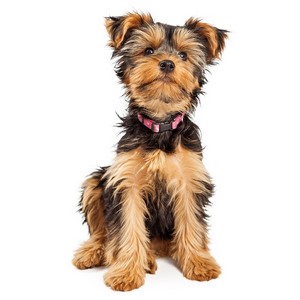Are Yorkshire Terriers Good For Apartments?
Are you living in an apartment unit or flat and thinking to adopt a Yorkshire Terrier and need to know whether a Yorkshire Terrier Dog is suitable for your apartment?
Well, Yorkshire Terrier scores  out of 5 in the scale of apartment friendly dogs when it comes to other dog breeds.
out of 5 in the scale of apartment friendly dogs when it comes to other dog breeds.
Can Yorkshire Terriers Be Apartment Dogs?
-
The Yorkie is a good dog for apartment life. It is very active indoors and will do okay without a yard. The Yorkie is sensitive to the cold and prefers warm climates.
Best 5 Apartment-Friendly Pet Dog Breeds
Personality, bark-levels and a low-energy count are all really good characteristics to look for when on the hunt for an ideal apartment pet dog. Below is a list of the top apartment frinedly breeds.
1. English Bulldog - Despite appearances, the English Bulldog is a happy dog that is more than happy to spend their days sleeping on the couch. They will barely bark, and are great with children in spite of their stocky build which has them weighing upwards of 22kg!
2. Pug - Love them or hate them, the modest pug is a playful and loyal dog. Pugs are a social breed, so their ideal home would involve another dog or lots of human interaction. The pug is content to laze about all day, making him the perfect apartment pal.
3. Chihuahua - While the Chihuahua calls for minimal exercise, making it ideal for a smaller home, it is very important that they receive appropriate training to avoid the yappy character they are known for. Weighing as little as 1kg, they are effortlessly carried around which is handy for individuals who travel.
4. Dachshund - Also known as the 'sausage dog', this friendly breed is extremely good with other canines and children. While they can originally be somewhat hard to train, they only need a small amount of exercise, due to their tiny legs!
5. Boston Terrier - Another breed right due to their size, the Boston Terrier will need a daily walk to stay happy, but they can be fantastic, caring breed who will remain mostly inactive while indoors.
What to do if you lose your Yorkshire Terrier
If your Yorkshire Terrier Dog or any other pet has gone missing and it does not have an identification tag with a phone number, you can:
1. List your missing pet details at Pet Reunite website here.
2. Report the missing pet on the Local Lost Pets Facebook Groups Here.
3. Call the local vet clinics to see if anyone has handed in your lost pet.
4. Phone the RSPCA or Visit the RSPCA Lost Pets website and complete a Lost Pet Report.
5. Visit Lost Pets Pages of Animal Shelters.
What to do if you find a lost Yorkshire Terrier
If you find a Yorkshire Terrier Dog or any other pet and it does not have an identification tag with a phone number, you can:
1. Register the found pet details at Pet Reunite website here.
2. Register the missing pet on the Local Facebook Lost Pets Groups.
3. Contact the Local Authority to collect the lost animal.
4. Take the pet to the local Animal Shelter assigned to your area.
5. Take the pet to the local Vet Clinic who usually scan the animal’s microchip and call the registered pet owner.
Laws Regarding Missing Pets
1. It is against the law to keep any animal that you find.
2. Pets are generally considered property and it is illegal to take and keep someone else’s property.
3. You must contact your local animal control unit and file a FOUND AN ANIMAL report for any dog or cat you find.
4. To reclaim your lost dog, cat or other pet from the animal shelter you must pay a release fee.
5. If your dog or cat is unregistered, you will have to register your pet before you can take it home.

